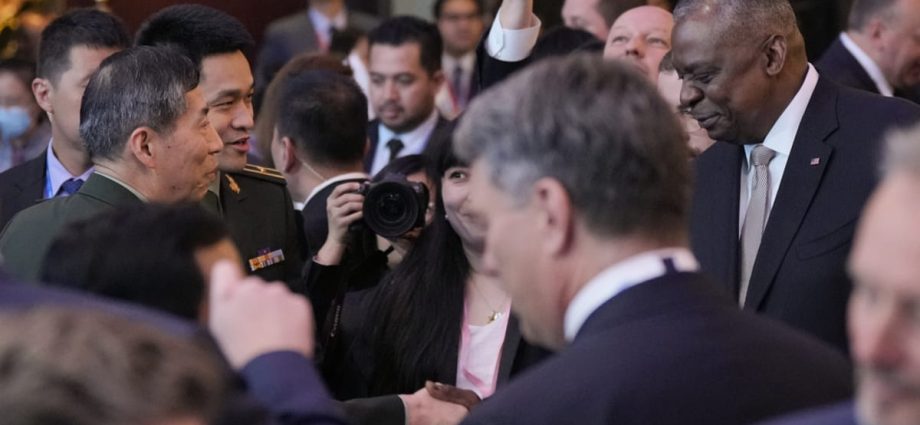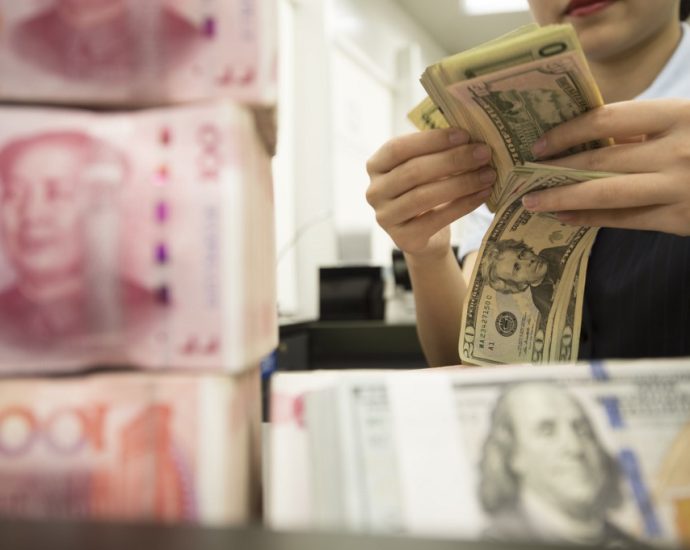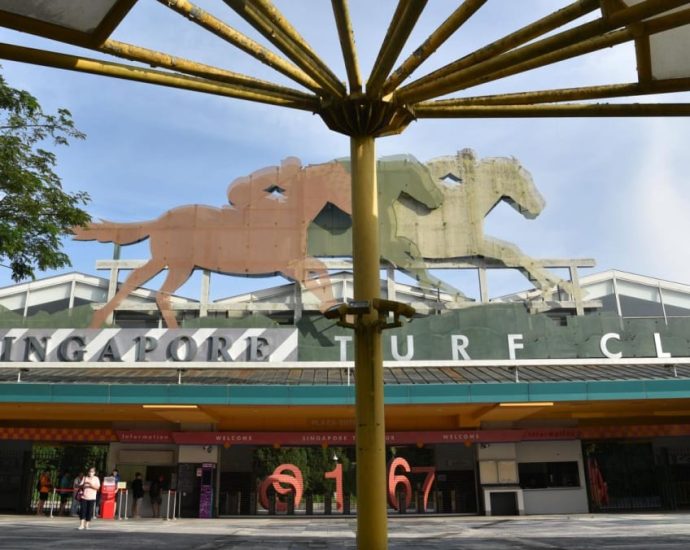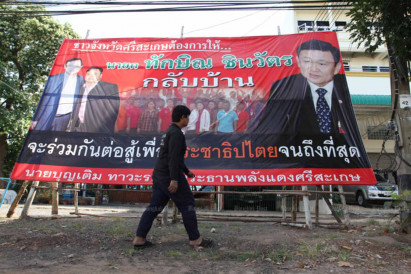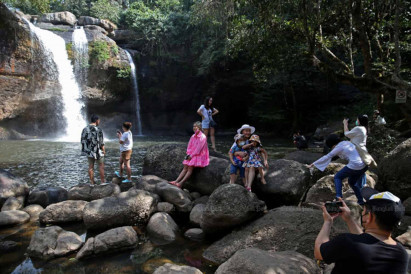âWould you two please talk?â: Observers lament underwhelming US, China handshake at Shangri-La Dialogue
Prof Thayer said that while the US has been careful to adhere to international law and not violate China’s airspace in its surveillance activities, China sees them as reconnaissance that is too close for comfort. “China’s quite unequivocal that nations outside of the region, including the US and Australia, don’tContinue Reading
350 employees affected by Turf Club closure, around 700 horses will be exported

SINGAPORE: All 350 employees of the Singapore Turf Club will be retrenched in phases, with the first round taking place in about 16 months as the club prepares to hand 120 hectares of land back to the government in 2027.
Around 700 horses will be exported and the last race will be held on Oct 5, 2024.
The Ministry of Finance (MOF) and Ministry of National Development (MND) said in a joint press release on Monday (Jun 5) that spectatorship for local horseracing has declined over the years and the land in Kranji can be redeveloped to better meet Singapore’s future land use needs.
The site will be used for housing and other potential uses, including leisure and recreation.
Singapore Turf Club will close its facility by March 2027.
“Over the next three years, Singapore Turf Club will engage with stakeholders and address their respective needs,” the club said on Monday.
“A phased approach based on business needs will be deployed to ensure the continuation of successful operations and a smooth handover.”
Singapore Turf Club president and chief executive Ms Irene Lim said: “During this time, affected employees and those working within the horse racing community will have ample time to consider their career options and manage their personal commitments.”
The club added that employees will receive support during the transition, including a retrenchment package, personal career guidance and skills-training courses.
Chairman of Singapore Turf Club Niam Chiang Meng said staff were informed about the closure on Monday morning.
“Generally, the atmosphere is one where they are all very saddened by the decision to close down the club,” he said at a press conference.
“We will continue running (and) ensure a smooth transition for everyone, including the employees, the horse owners, and all the other stakeholders that are involved.”
RACEHORSES TO BE EXPORTED
Around 700 horses from the club’s horse racing operations will be exported and 2026 is the target for that move to be completed, said Second Minister for Finance and for National Development Indranee Rajah.
Mr Niam added that there are 38 livery horses at the club’s racecourse. A livery yard is a stable where horse owners can keep their animals for a fee.
MOF and MND said racehorse trainers and owners will receive support for horse maintenance and exportation.
For other affected stakeholders, such as Singapore Turf Club tenants and livery horse owners, the club will continue to honour its existing contractual obligations, the joint press release said.
BRICS currency gambit a timely warning to the buck
On the sidelines of the recent BRICS gathering in Cape Town, South Africa, officials contemplated as rarely before the five most dangerous words in economics: things are different this time.
For years now, Brazil, Russia, India, China, South Africa and other emerging economies hoped to break the dollar hegemony that complicates geopolitical calculations. In Cape Town, BRICS foreign ministers presided over what might be remembered as the moment the anti-dollar movement grew genuine legs.
In the lead-up to the confab, BRICS members urged the bank that the grouping set up to study how a joint currency might work — logistics, market infrastructure and how sanctions against Russia play into things.
Equally important is the flurry of foreign exchange arrangements popping up that exclude the dollar: China and Brazil agreeing to settle trade in yuan and reals; France beginning to conduct some transactions in yuan; India and Malaysia increasing use of the rupee in bilateral trade; Beijing and Moscow trading in yuan and rubles.
The 10-member Association of Southeast Asian Nations (ASEAN) is joining forces to do more regional trade and investment in local currencies, not dollars. Indonesia, ASEAN’s biggest economy, is working with South Korea to ramp up transactions in rupiah and won.
Pakistan is angling to begin paying Russia for oil imports via yuan. The United Arab Emirates is talking with India about doing more non-oil trade in rupees.
Over the weekend, Argentina announced it plans to double its currency swap line with China to roughly US$10 billion. It’s partly desperation as Argentina’s foreign currency reserves evaporate amid 109% inflation that has its central bank in damage control mode.
But it’s also a sign of the rising anti-dollar movement in South America.
“Despite America’s likely opposition, de-dollarization will persist, as most of the non-Western world wants a trading system that does not make them vulnerable to dollar weaponization or hegemony,” says Frank Giustra, co-chair of the International Crisis Group. “It’s no longer a question of if, but when.”
Economist Rory Green at TS Lombard adds that “geopolitics and China’s economic heft is driving — and will continue to drive — RMB adoption for trade and reserve holdings. Greater international use of the RMB will provide channels for sanctions-busting, but the dollar is not under threat.”

To be sure, Green adds, “China is politically unwilling and economically unable — barring significant structural reform — to run a sustained current account deficit and to provide sufficient supplies of RMB assets globally,” which complicates Beijing’s designs on competing with the dollar.
Here, BRICS members’ stepping up with a strength-in-numbers gambit could be a game-changer.
Already, they account for 23% of global gross domestic product (GDP) and more than 42% of the world’s population. At present, at least 19 other countries — including Saudi Arabia — want to join the BRICS fold, which would greatly grow its influence.
For now, the five BRICS nations are pooling $100 billion of foreign currency to act as a financial shock absorber. The funds can be tapped in emergencies, allowing members to avoid going to the International Monetary Fund. Since 2015, the BRICS bank has approved more than $30 billion of loans for infrastructure, transportation and water.
The BRICS currency issue has been gaining greater traction since mid-2022, when the 14th BRICS Summit was held in Beijing. There, Russian President Vladimir Putin said the BRICS were cooking up a “new global reserve currency” and were open to expanding its usage more widely.
In April, Brazilian President Luiz Inacio Lula da Silva threw his support behind a BRICS monetary unit.
“Why can’t an institution like the BRICS bank have a currency to finance trade relations between Brazil and China, between Brazil and all the other BRICS countries?” he asked. “Who decided that the dollar was the trade currency after the end of gold parity?”
Lula’s return to the presidency four months earlier was a boost to the “Global South” ambitions that Chinese leader Xi Jinping has been championing. In his third term, Xi is putting greater emphasis on morphing the Global South, or developing countries in the regions from Latin America to Africa to Asia to Oceania, into a bigger economic and diplomatic force.
Brazilian Finance Minister Fernando Haddad has been highlighting the increased use of local currencies in bilateral trade instruments like credit receipts. The focus, he says, must be phasing out the use of a third currency.
“The advantage is to avoid the straitjacket imposed by necessarily having trade operations settled in the currency of a country not involved in the transaction,” he told reporters.
Lula may get his answers in August when the BRICS summit of heads of state is held in Johannesburg. The desire for a BRICS version of the euro might get a boost from countries like Egypt, Indonesia, Turkey and Saudi Arabia joining.

BRICS Ambassador Anil Sooklal says others keen to join include Afghanistan, Algeria, Argentina, Bahrain, Bangladesh, Belarus, Iran, Kazakhstan, Mexico, Nicaragua, Nigeria, Pakistan, Senegal, Sudan, Syria, the United Arab Emirates, Thailand, Tunisia, Uruguay, Venezuela and Zimbabwe. Sooklal hints that some European countries might sign up, too.
That, of course, also could add to the BRICS’ troubles. The more this grouping adds members with disparate economies and challenges and conflicting ambitions, the more vulnerable the enterprise becomes. Russia’s involvement alone, post-Ukraine invasion, complicates the broader legitimacy of the BRICS project.
The main problem, says Paul McNamara, investment director at GAM Investments, is that BRICS is still an acronym in search of a cohesive economic argument. It was coined in 2001 by then-Goldman Sachs economist Jim O’Neill.
More likely, McNamara says, it will be one country alone that challenges the dollar: China. After all, he reasons, without China at the core, would most current global elites care about the BRICS?
Some think it could take longer to dislodge the dollar. Though the dollar’s dominance will take time to unravel, the trajectory away from it is clear, says Vikram Rai, a senior economist at TD Bank.
“Within the next decade or two, there is great potential for regionally dominant currencies and a multipolar international regime to emerge, with the roles filled now by the dollar shared with the euro, a more open yuan, future central bank digital currencies and possibly other options we have yet to see,” Rai argues.
In a report last week, Moody’s Investors Service analysts wrote: “We expect a more multipolar currency system to emerge over the next few decades, but it will be led by the greenback because its challengers will struggle to replicate its scale, safety and convertibility in full.”
Yet a bigger US pivot to protectionism, further risks of a default and weakening institutions are threatening the dollar’s global influence, Moody’s warns.
“The greatest near-term danger to the dollar’s position stems from the risk of confidence-sapping policy mistakes by the US authorities themselves, like a US default on its debt for example,” Moody’s analysts say. “Weakening institutions and a political pivot to protectionism threaten the dollar’s global role.”
Even though US lawmakers raised the debt ceiling this time, Fitch Ratings is keeping Washington on watch for a potential downgrade. Fitch worries that the threat of default is now becoming a routine political ploy.
Fitch cautions “that repeated political standoffs around the debt-limit and last-minute suspensions before the X-date — when the Treasury’s cash position and extraordinary measures are exhausted — lowers confidence in governance on fiscal and debt matters.”
What worries Fitch analyst James McCormack is US lawmakers missing the plot of protecting America’s AAA rating. Politicians must understand that “you’re playing with live ammunition here,” McCormack told CNN. “This is an extremely dangerous situation. There is a lot at stake.”

Among the biggest risks the US is taking is losing the “exorbitant privilege” that comes with printing the international reserve currency. This phrase was coined by 1960s French Finance Minister Valéry Giscard d’Estaing, who noted the dollar’s pivotal role allowed the US to live beyond its financial means, year after year.
In April, French President Emmanuel Macron said that Europe should curb its dependence on the “extraterritoriality of the US dollar.”
That’s particularly so as Sino-US tensions intensify. If the tensions between the two superpowers heat up, Macron said, “We won’t have the time nor the resources to finance our strategic autonomy and we will become vassals.”
That same month, Tesla founder Elon Musk warned via tweet that “de-dollarization is real and is happening fast. If you weaponize currency enough times, other countries will stop using it.”
Economist Stephen Jen at Eurizon SLJ Asset Management notes that “exceptional actions” — including sanctions imposed by the US and its allies against Moscow — have made all too many nations less willing to hold dollars.
Jen is quoted saying that the dollar suffered a “stunning collapse” in its market share as a reserve currency in 2022, “presumably due to its muscular use of sanctions.”
He calculates that the dollar’s share of official global reserves fell to 47% last year, down from 55% in 2021 and a marked collapse from the 73% in 2001. Its loss of market share in 2022 alone was 10 times faster than the steady erosion over the past two decades, Jen says.
Billionaire Ray Dalio, founder of the Bridgewater Associates hedge fund, agrees that “there’s less of an eagerness to buy” US Treasury securities.
He points to Western steps to freeze about $300 billion of Russian central bank assets, punitive moves Dalio says, “increased the perceived risk that those debt assets can be frozen in the way that they’ve been frozen for Russia.”
Yet, even just based on the economics, says BRICS concept founder O’Neill, the global system seems ready for a pivot.
“The US dollar plays a far too dominant role in global finance,” O’Neill notes. “Whenever the Federal Reserve Board has embarked on periods of monetary tightening, or the opposite, loosening, the consequences on the value of the dollar and the knock-on effects have been dramatic.”
That dynamic helped pave the way for events in Cape Town over the last few days, an event that may have legs in currency circles for generations to come.
Follow William Pesek on Twitter at @WilliamPesek
Horse racing in Singapore to end in October 2024; Turf Club site to be redeveloped
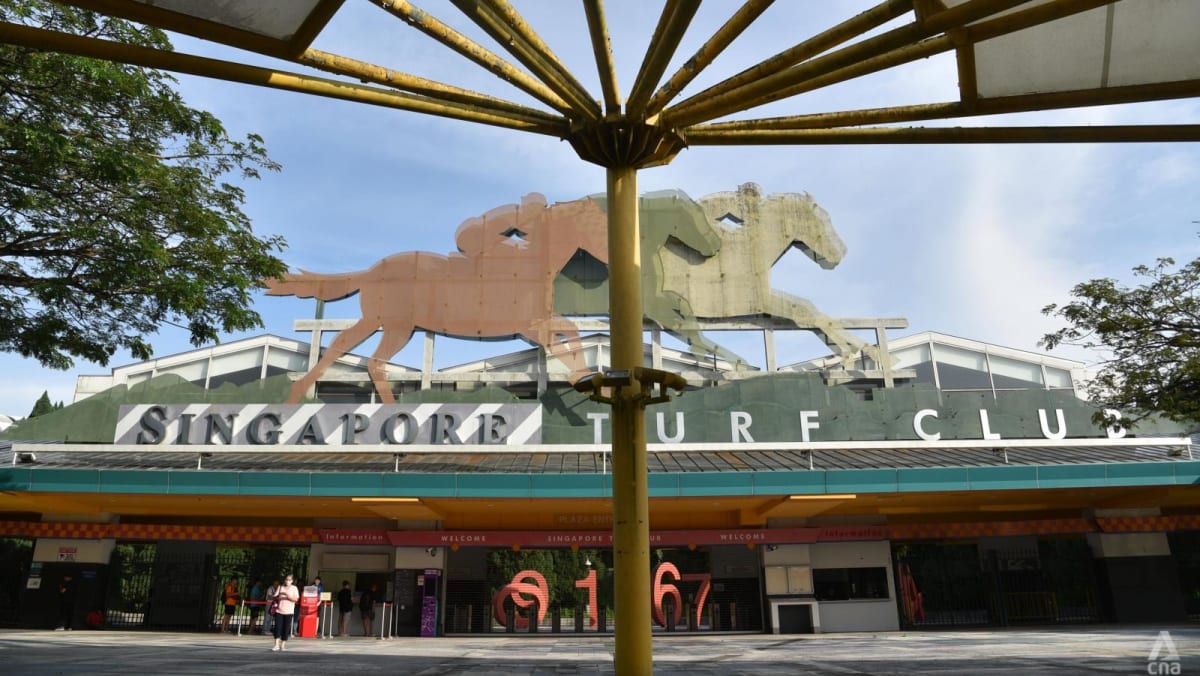
SINGAPORE: Horse racing in Singapore will come to an end in October 2024, with the Singapore Turf Club site in Kranji to be handed back to the government in 2027 for redevelopment.
The Singapore Turf Club will hold its last race on Oct 5, 2024, and close its facility by March 2027, the government and Singapore Turf Club announced on Monday (Jun 5).
The 120 hectares of land in Kranji that is home to the Singapore Racecourse will be redeveloped and used for housing, including public housing, the Ministry of National Development (MND) and Ministry of Finance (MOF) said in a joint press release.
The government is also studying other potential uses, including leisure and recreation.
“This was not an easy decision, but necessary,” said Second Minister for Finance and for National Development Indranee Rajah at a press conference on Monday afternoon, adding that there has been an increasing demand for land in Singapore.
Spectatorship has also fallen over the decade. The average attendance per race day has declined significantly, from 11,000 in 2010 to about 6,000 in 2019.
After the reopening of the Singapore Racecourse in 2022 amid the COVID-19 pandemic, the average attendance was about 2,600 spectators per race day, said Ms Indranee. This decrease in spectatorship is not unique to Singapore, with other countries experiencing similar declines, she added.
The Singapore Turf Club was founded in 1842 and is Singapore’s only horse racing club.
“We are saddened by the decision of the government to close the club. At the same time, we understand the land needs of Singapore, including housing and other potential uses such as leisure and recreation,” said the club’s chairman Niam Chiang Meng.
“We will do our best to ensure business as usual for the club until our final race meeting,” he said, adding that the club will work with stakeholders to ensure a “smooth exit for local horse racing”.
LAND NEEDS
MOF and MND said that redeveloping the racecourse site will allow for the land and its surroundings to be “holistically master planned” to better meet Singapore’s future land use needs.
This is in addition to other major plans for the country’s northern region, which include the redeveloping Woodlands Checkpoint, enhancing Woodlands, and a masterplan for a high-tech agri-food cluster in Lim Chu Kang.
“The northern area has a lot of potential for development, and what we will be doing is assessing and studying to have an integrated and holistic plan to see how it can be developed properly,” said Ms Indranee.
“It has a lot of potential, and the land that will be taken back from (Singapore Turf Club) will be part of this future development.”
Singapore’s need for land, as well as the decline in the number of spectators, meant the government felt “it would be best” to take back the land, she added.
When asked about the potential number of public housing units that may be developed on the current Singapore Turf Club site, she said: “It would be too early to say at this stage, because it has to be part of a wider plan for the northern region.”
Mr Niam said: “Singapore Turf Club recognises that the Kranji site is a valuable resource that can help meet the evolving needs and aspirations of Singaporeans, and this transition will serve to optimise land use for the greater good for the local community and future generations.
“We are aligned with the government on the need to invest in the future of Singapore.”
Responding to a question about why the Kranji site was chosen over others, such as golf courses, Ms Indranee noted that the government has taken back “quite a number” of golf courses in the last few years.
“If you think about it, the 120 hectares of land, there are very few other places in Singapore where you have this kind of size, where it would be possible to take housing, including public housing,” she said.
Modric, Lloris among ‘more than 10’ Saudi targets: Source
RIYADH: Luka Modric and Hugo Lloris feature on a list of “more than 10” top-level Saudi Arabian football transfer targets headed by Lionel Messi and Karim Benzema, a source close to the negotiations has told AFP. Sergio Ramos, Jordi Alba, Sergio Busquets, N’Golo Kante, Angel Di Maria and Roberto FirminoContinue Reading
Tour fraudsters arrested in Surat Thani

SURAT THANI: Three men and three women were arrested for allegedly selling bogus overseas tours worth about 27 million baht.
Pol Maj Gen Saranyu Chamnanrat, Surat Thani police chief, said on Monday the suspects were arrested at their office in Phun Phin district of the southern province on Sunday.
The arrest followed complaints from 99 local people that they had bought tour packages for trips to Japan and European countries from the suspects’ company, but their trips never materialised.
The complainants said they paid about 27 million baht altogether to the company after it advertised cheap tour packages on Facebook. The suspects are 40-60 years old and are natives of Phun Phin, Ban Ta Khun and Kanchanadit districts.
Pol Maj Gen Saranyu said the suspects opened their company early last year and claimed the Tourism Authority of Thailand subsidised their tour packages.
Thaksin set to return in July, says daughter Paetongtarn

Pheu Thai Party’s prime ministerial candidate Paetongtarn “Ung Ing” Shinawatra said Thaksin, her father and former prime minister, looks set to return to Thailand in July, but the exact date is not yet known.
“I don’t know the exact date yet. He (Thaksin) said it would be next month (July),” Ms Paetongtarn said on Sunday, in responding to questions from reporters.
Thaksin, who lives in exile in Dubai, had said he would return home in July, citing his old age and the desire to be with his grandchildren.
Asked whether she planned to go to Dubai to accompany her father back home, she said: “As a daughter, I would like to do that so we could come back together. I am very excited. But this is not yet definite. I would tell you when I know for sure.”
Asked again whether Thaksin would definitely return in July, Ms Paetongtarn said: “I respect my dad’s decision. So, whatever it is, I give him my full moral support.”
When asked about the matter, Chaithawat Tulathon, the Move Forward Party secretary-general, said it was Thaksin’s own decision. If he returns, he has the right to enter a normal legal process.
Asked about Move Forward’s plan to be propose a draft bill to pardon people indicted in political cases, Mr Chaithawat said this had nothing to do with Thaksin’s plan to return. The legislation would be intended for people who had been indicted in political cases, not corruption or criminal ones, he added.
Thaksin was overthrown in a military coup on 19 Sept, 2006. He has since lived in self-imposed exile except for a brief visit to Thailand in 2008.
During his absence from the country, the Supreme Court’s Criminal Division for Holders of Political Positions sentenced him in absentia to a total of 12 years imprisonment in four cases.
In the first case, the court found him guilty of abuse of power in his wife Khunying Potjaman’s purchase of a state-owned plot in Ratchadapisek area at a price far below the market value. In October 2008, he was sentenced to two years in prison. However, the 10-year statute of limitations for the court ruling expired in October 2018.
In the second case, Thaksin was sentenced to two years in prison after he was found guilty of malfeasance in a case concerning the two- and three-digit lottery.
In the third case, Thaksin was handed down three years in jail for abusing his position by authorising loans totaling 4 billion baht to Myanmar via the Export-Import Bank of Thailand. The loans were then spent on buying supplies from a telecom firm owned by his family.
In the fourth case, the former prime minister was given five years in prison when the court found him guilty of using nominees to hold shares in Shin Corp. The law prohibits any political office holder from owning shares in a telecommunications company.
The statutes of limitations for the court decisions on the second, third and fourth cases have not expired.
Thousands flock to Khao Yai for long holiday

Thousands of travellers flocked to Khao Yai National Park for a long holiday from June 3-5, generating nearly 800,000 baht in revenue for the park from entrance fees, park chief Chaiya Huayhongthong revealed on Monday.
He said a total of 13,370 Thai and foreign holidaymakers visited the park during the period. They included 11,947 Thai adults, 943 Thai children, 394 foreign adults and 86 foreign children.
They travelled to the park via two entry points – the Chao Pho Khao Yai Shrine in Pak Chong district, Nakhon Ratchasima province, and Noen Hom in Muang district, Nakhon Nayok – with 3,585 cars, 623 motorcycles and a six-wheel passenger bus. The park collected a total of 784,590 baht in revenue from entrance fees.
Elderly people aged 60 and over, 578 in total, and 54 children aged 3 and lower were exempted from the entrance fees.
Khao Yai National Park is a World Heritage Site straddling Saraburi, Nakhon Ratchasima, Prachinburi, and Nakhon Nayok provinces. It is still rich with natural resources such as forests and wildlife, and well-known for natural tourist spots with cool weather throughout the year.
Only about 170 kilometres from Bangkok, the park’s scenic views draw numerous visitors, especially during long holidays.
Mr Chaiya said on Saturday night more than 1,000 holidaymakers occupied the Lam Ta Khong camping site, adjacent to wildlife grazing nearby.
If they are lucky, they may also see a herd of 10-20 wild elephants passing by, he added.
Car drives off with cyclist on bonnet after alleged altercation in Katong, 2 women assisting in police probe
SINGAPORE: A female cyclist was caught on camera jumping onto the bonnet of a car following an alleged altercation with the driver along East Coast Road on Friday (Jun 2). In response to TODAY’s queries, the police said that they received a call for assistance along 112 East Coast RoadContinue Reading
Man serving sentence for raping woman thrice in 2013 fails in fresh bid for jail term to be cut

SINGAPORE: A man who was sentenced to almost 17 years’ jail in 2016 for raping a woman thrice in public has failed in his attempt to have his imprisonment term cut.
Lim Choon Beng, now 37, had raped and sexually assaulted the victim at three locations along public roads in February 2013.
The judicial commissioner who sentenced him to 16 years, 10 months and two weeks’ jail and 22 strokes of the cane in 2016 said Lim’s “shocking and brazen acts” shattered the idea that one can walk safely on a public road in Singapore at any time of day.
The 24-year-old victim was accosted while walking home alone, with an intoxicated Lim sitting on her, hitting her head against the wall and raping her.
He ceased his assault only when a taxi stopped near them.
Lim had pleaded guilty after a few days of trial, but appealed against his sentence. The Court of Appeal heard his case but dismissed it, finding no error in how he was sentenced.
Lim made an application this year under the Criminal Procedure Code asking for permission to apply for the Court of Appeal’s decision to be reviewed.
He is currently serving his sentence of almost 17 years, meted out in 2016.
Lim, who is self-represented, said there was a “gross miscarriage of justice” in the sentence given. He asked for a reduction of almost two years of his sentence, to 15 years’ jail.
He based his application on a claim that there had been a change in law, according to the case of Chang Kar Meng, which the judge had relied on in sentencing him.
In his judgment released on Monday (Jun 5), Justice of the Court of Appeal Tay Yong Kwang dismissed Lim’s application.
Justice Tay said Lim had failed to show that there was sufficient material to show a miscarriage of justice.
“The decision in Chang Kar Meng has no impact on his case,” said Justice Tay. “There is clearly no miscarriage of justice in his sentencing and the sentences imposed for the rape offences were in fact considered to have been lenient.”
He dismissed the application without setting it down for hearing.

